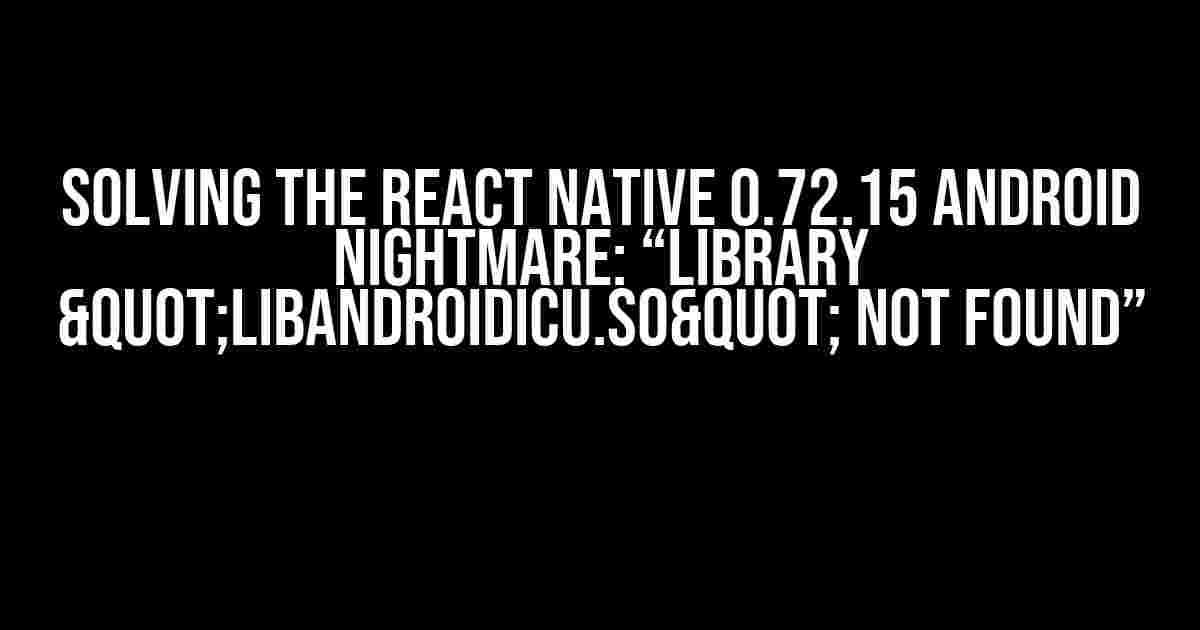Are you tired of running into the infamous “library "libandroidicu.so" not found” error when building your React Native 0.72.15 Android app? You’re not alone! This frustrating issue has been plaguing developers for far too long, and it’s high time we put an end to it. In this article, we’ll take a deep dive into the world of library linking, ICU libraries, and Android architecture to get your app up and running smoothly.
What’s the Deal with libandroidicu.so?
Before we dive into the solution, let’s take a step back and understand what’s causing this error. The “library "libandroidicu.so" not found” error occurs when the Android build process can’t locate the ICU (International Components for Unicode) library, specifically the libandroidicu.so file. This library is responsible for providing Unicode and globalization support to your app.
The ICU library is typically included in the Android NDK (Native Development Kit), which is why it’s not directly included in your React Native project. However, when you run the command `npx react-native run-android`, the build process tries to link the ICU library, but fails to find it.
Method 1: Update Your Android NDK
The first solution to this problem is to update your Android NDK to the latest version. Sometimes, the ICU library might be missing or outdated in older NDK versions.
To update your Android NDK, follow these steps:
- Open your terminal and navigate to the `android` directory of your React Native project.
- Run the command `cd android` to enter the `android` directory.
- Run the command `sdkmanager –update` to update the Android SDK and NDK.
- Wait for the update process to complete. This might take a few minutes.
- Once the update is complete, run the command `npx react-native run-android` to try building your app again.
Method 2: Add ICU Library to Your Project
If updating the Android NDK doesn’t solve the problem, we need to take matters into our own hands and manually add the ICU library to our project.
To do this, follow these steps:
- Download the ICU library from the official Android NDK website. You can find the download links in the Android NDK downloads page.
- Extract the downloaded archive to a directory on your system, for example, `~/Android/icu`.
- Create a new directory in your project’s `android` directory called `jniLibs`. This will hold the ICU library files.
- Copy the `libandroidicu.so` file from the extracted ICU library directory to the `jniLibs` directory.
- Open your `android/app/build.gradle` file and add the following code to the `android` block:
android {
...
defaultConfig {
...
ndk {
abiFilters 'armeabi-v7a', 'x86', 'arm64-v8a', 'x86_64'
}
cmake {
arguments "-DANDROID_ICU_ROOT=jniLibs"
}
}
...
}
This code tells the build process to look for the ICU library in the `jniLibs` directory.
Method 3: Use a Custom ICU Library
If the above methods don’t work, we can try using a custom ICU library that’s specifically built for React Native.
To use a custom ICU library, follow these steps:
- Download the pre-built ICU library for React Native from this GitHub repository.
- Extract the downloaded archive to a directory on your system, for example, `~/Android/icu-react-native`.
- Create a new directory in your project’s `android` directory called `jniLibs`. This will hold the ICU library files.
- Copy the `libicu.so` file from the extracted ICU library directory to the `jniLibs` directory.
- Open your `android/app/build.gradle` file and add the following code to the `android` block:
android {
...
defaultConfig {
...
ndk {
abiFilters 'armeabi-v7a', 'x86', 'arm64-v8a', 'x86_64'
}
cmake {
arguments "-DANDROID_ICU_ROOT=jniLibs"
}
}
...
}
This code tells the build process to look for the ICU library in the `jniLibs` directory.
Troubleshooting Tips
If none of the above methods work, here are some troubleshooting tips to help you identify the issue:
- Check if you have the correct version of the Android NDK installed. You can check the version by running the command `sdkmanager –list`.
- Make sure you have the correct ICU library version downloaded. You can check the version by running the command `icuinfo` in your terminal.
- Verify that the `jniLibs` directory is correctly configured in your `build.gradle` file.
- Try cleaning and rebuilding your project by running the command `cd android && ./gradlew clean && ./gradlew build`.
- Check if there are any other libraries conflicting with the ICU library. You can do this by reviewing your `build.gradle` file and checking for any other libraries that might be causing issues.
Conclusion
Solving the “library "libandroidicu.so" not found” error in React Native 0.72.15 Android can be a challenge, but with the right approach, it’s definitely doable. By updating your Android NDK, adding the ICU library to your project, or using a custom ICU library, you should be able to get your app up and running smoothly.
Remember to try each method carefully, and don’t hesitate to reach out if you encounter any issues. Happy coding!
| Method | Description |
|---|---|
| Method 1 | Update Android NDK to the latest version |
| Method 2 | Add ICU library to project manually |
| Method 3 | Use a custom ICU library for React Native |
Frequently Asked Question
Got stuck with the infamous “libandroidicu.so” error in React Native 0.72.15 Android? Don’t worry, we’ve got you covered! Check out these FAQs to get your app back on track.
What causes the “libandroidicu.so” error in React Native 0.72.15 Android?
The “libandroidicu.so” error typically occurs when the International Components for Unicode (ICU) library is missing or not properly linked in your React Native Android project. This can happen when you upgrade to React Native 0.72.15 or when you switch to a new Android version.
How do I resolve the “libandroidicu.so” error in React Native 0.72.15 Android?
To resolve the error, you can try the following solutions: 1) Check if the ICU library is present in your project by running `react-native run-android –verbose`. 2) If the library is missing, add the following line to your `android/app/build.gradle` file: `android { … defaultConfig { … ndk { abiFilters ‘armeabi-v7a’, ‘x86’, ‘arm64-v8a’, ‘x86_64’ } } }`. 3) Clean and rebuild your project by running `cd android && ./gradlew clean && cd .. && react-native run-android`.
Do I need to add any additional dependencies to my React Native project to resolve the “libandroidicu.so” error?
Yes, you may need to add the ICU library as a dependency in your project. You can do this by adding the following line to your `android/app/build.gradle` file: `dependencies { implementation ‘androidx.icu:icu4j:71.1’ }`. This will ensure that the ICU library is included in your project and resolves the “libandroidicu.so” error.
Can I use an older version of React Native to avoid the “libandroidicu.so” error?
While using an older version of React Native might seem like an easy solution, it’s not recommended. Older versions may have their own set of issues and compatibility problems. Instead, it’s better to resolve the “libandroidicu.so” error using the solutions mentioned above. This will ensure that your project is up-to-date and compatible with the latest React Native version.
How do I know if the “libandroidicu.so” error is resolved in my React Native project?
Once you’ve applied the solutions mentioned above, run your React Native Android project using `react-native run-android`. If the project builds and runs successfully without any errors, you’ve successfully resolved the “libandroidicu.so” error. You can also check the project logs to ensure that the ICU library is properly linked and the error is no longer present.


